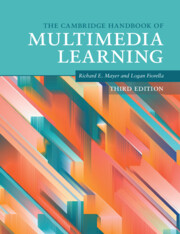Book contents
- The Cambridge Handbook of Multimedia Learning
- The Cambridge Handbook of Multimedia Learning
- Copyright page
- Contents
- Figures
- Tables
- Contributors
- Preface
- Acknowledgments
- Part I Background
- Part II Theoretical Foundations
- Part III Basic Principles of Multimedia Learning
- Part IV Principles for Reducing Extraneous Processing in Multimedia Learning
- Part V Principles for Managing Essential Processing in Multimedia Learning
- Part VI Principles Based on Social and Affective Features of Multimedia Learning
- Part VII Principles Based on Generative Activity in Multimedia Learning
- 28 The Generative Activity Principle in Multimedia Learning
- 29 The Mapping Principle in Multimedia Learning
- 30 The Drawing Principle in Multimedia Learning
- 31 The Imagination Principle in Multimedia Learning
- 32 The Self-Explanation Principle in Multimedia Learning
- 33 The Guided Inquiry Principle in Multimedia Learning
- 34 The Feedback Principle in Multimedia Learning
- 35 The Learner Control Principle in Multimedia Learning
- 36 The Cognitive Load Self-Management Principle in Multimedia Learning
- Part VIII Multimedia Learning with Media
- Author Index
- Subject Index
- References
31 - The Imagination Principle in Multimedia Learning
from Part VII - Principles Based on Generative Activity in Multimedia Learning
Published online by Cambridge University Press: 19 November 2021
- The Cambridge Handbook of Multimedia Learning
- The Cambridge Handbook of Multimedia Learning
- Copyright page
- Contents
- Figures
- Tables
- Contributors
- Preface
- Acknowledgments
- Part I Background
- Part II Theoretical Foundations
- Part III Basic Principles of Multimedia Learning
- Part IV Principles for Reducing Extraneous Processing in Multimedia Learning
- Part V Principles for Managing Essential Processing in Multimedia Learning
- Part VI Principles Based on Social and Affective Features of Multimedia Learning
- Part VII Principles Based on Generative Activity in Multimedia Learning
- 28 The Generative Activity Principle in Multimedia Learning
- 29 The Mapping Principle in Multimedia Learning
- 30 The Drawing Principle in Multimedia Learning
- 31 The Imagination Principle in Multimedia Learning
- 32 The Self-Explanation Principle in Multimedia Learning
- 33 The Guided Inquiry Principle in Multimedia Learning
- 34 The Feedback Principle in Multimedia Learning
- 35 The Learner Control Principle in Multimedia Learning
- 36 The Cognitive Load Self-Management Principle in Multimedia Learning
- Part VIII Multimedia Learning with Media
- Author Index
- Subject Index
- References
Summary
Mental imagery is a generative learning strategy that encourages students to construct a mental representation – a mental image – of the content of a text. Mental images are valuable tools for thinking and learning because they provide a framework for remembering, organizing, and elaborating text information. The research base indicates that mental imagery strategies facilitate not only recall, but also comprehension and transfer performance. An important boundary condition is that students need to receive appropriate instructional support for imagining. Instructional support has been found to consistently improve learning performance across outcome measures for children and adults. Types of support range from training students on how to imagine text content to providing specific instructions on what to imagine, or offering additional material like external pictures.
Keywords
Information
- Type
- Chapter
- Information
- The Cambridge Handbook of Multimedia Learning , pp. 370 - 380Publisher: Cambridge University PressPrint publication year: 2021
References
Accessibility standard: Unknown
Why this information is here
This section outlines the accessibility features of this content - including support for screen readers, full keyboard navigation and high-contrast display options. This may not be relevant for you.Accessibility Information
- 4
- Cited by
